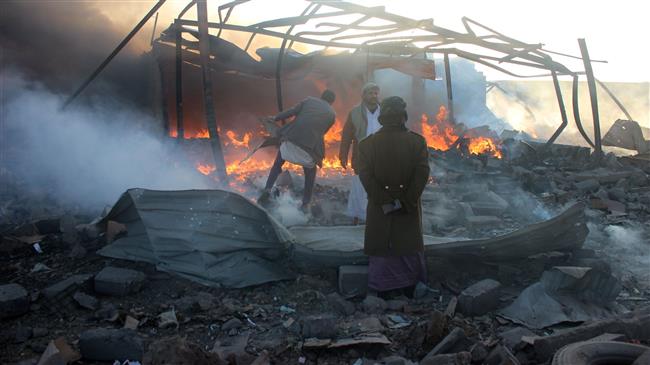
RNA - Martin Griffiths says he will develop a new framework to re-launch negotiations between the Saudis and Houthi Ansarullah resistance movement, but warned that fighting on the ground is still fierce. Griffiths has cited the firing of ballistic missiles against Saudi Arabia, intensified military operations in northwestern Sa’ada governorate, ongoing air raids and movements of forces in the Hudaida region as worrisome developments.
Here, top political figures in Ansarullah have already expressed the resistance movement’s openness toward peace talks. But negotiations are unlikely. The Saudi regime has ruled out any end to its indiscriminate airstrikes unless democracy is restored – read former Saudi puppet president Hadi is restored to power.
Nevertheless, the Saudis are not in a position to dictate policy or be the teacher of democracy in Yemen. They don’t support the heart of evolving humanity and they are not a leader worthy of being followed. They seek authority so that they may impose their policy without limitation. Strange enough, they now want the people of Yemen to choose their dictator.
No doubt the people of Yemen and the opposition are battling the world’s worst human rights violators. As citizens of their new democracy, they are the rulers and the ruled, the lawgivers and the law-abiding. They want to enjoy the highest civil, economic and social rights in a progressive community and they won’t support the return of a military dictator that cannot provide that. They certainly have no intention to renounce their feeling of choice either.
Within this context, the international community has to stop this immoral violence before it engulfs the entire region and before many more civilians die. The world community must force the Saudis to stop their criminal aggression and accept an immediate ceasefire. UN peace talks can then begin.
More than three years into this current crisis, Yemen is still torn apart by an interlinked series of conflicts with intricate and mobile front lines. These have resulted in what the UN has called “the largest humanitarian crisis in the world.” While compounded by three years of Saudi-led airstrikes, violence, and underdevelopment, the major cause of the humanitarian crisis in Yemen remains the US-backed, Saudi-led war.
But there are still opportunities for humanitarian actors in Yemen:
- A strong and unified initiative aimed at enhancing respect for international humanitarian law could not only protect populations at risk but also ease tensions among different communities within and outside of Yemen. The UN Security Council could help in this area by playing a more proactive role. The Council actors need to strengthen the perception of their neutrality and prevent the Saudis from manipulating them with money and lobby.
- The many actors involved in the humanitarian response should improve coordination. International humanitarian actors should directly involve the Ansarullah movement in humanitarian action and include them in coordination and decision making. In addition, humanitarian organizations could push Saudis to lift the blockade and facilitate access for both humanitarian and commercial shipments.
- The international community needs to invest in prevention in order to stem humanitarian needs and prevent further deterioration of the humanitarian crisis. This includes supporting Yemen’s healthcare facilities to prevent their total collapse and addressing the devastating impact of the lack of accountability on the part of Saudi Arabia and their allies for targeting civilian objects - indiscriminately and deliberately.
Put another way, humanitarian assistance could only begin if Saudis stopped their airstrikes first. To that end, the world community should call on Saudi Arabia and its coalition partners to lift the land, sea, and air blockade to avert an escalation of the humanitarian disaster.
According to Fars News Agancy, the international civil society should share the concerns of the UN and relief agencies that closing aid channels aggravates the already dire humanitarian situation in Yemen, where millions of people are at risk of famine, cholera, and other health crises. After all, the International Committee of the Red Cross is still unable to get clearance to ship chlorine tablets and many other medical data-x-items into Yemen.
Last but not the least, the international civil society should condemn the Saudi-led airstrikes and military actions in Yemen and the region that target and murder civilians. Because of the regional designs of the United States, Saudi Arabia and Israel, the long-suffering people of Yemen are paying a horrendous price. The colonialist invaders must end their war of aggression and deceit, and allow complete and unfettered humanitarian access to the war-torn country.
847/940